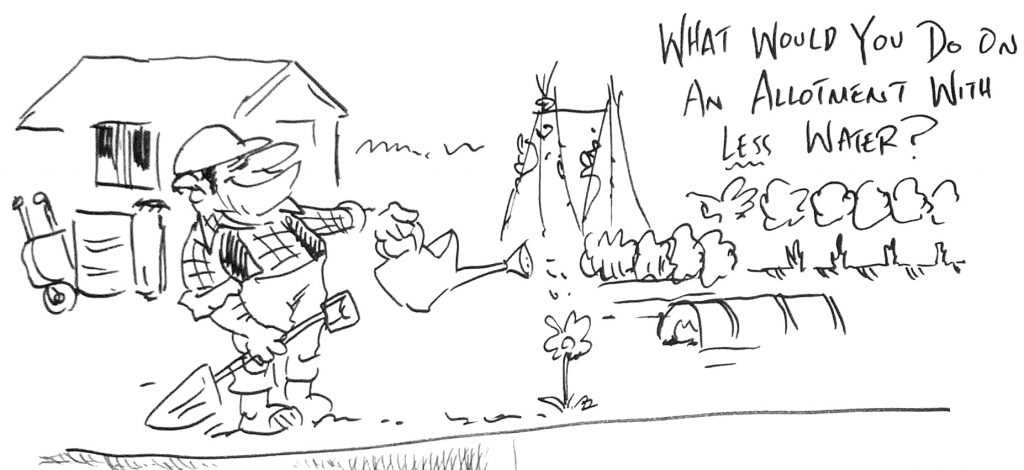Working with gardeners & allotmenteers
From the first seedling idea to harvest, a vast number of stories and knowledge grew out of Drought Risk and You (DRY). Supported by the National Allotment Society (NAS), this important and innovative aspect of the research project was led by the University of the West of England, Bristol.

The community of allotment holders and gardeners proved to be an even more plentiful source of information and fertile ideas than expected. Many of their stories of past water scarcity, their anecdotal evidence of effective ways to manage drought and to build resilience into the soil have been curated into DRY Utility, a rich source of stories, film, narratives and guidance notes about different groups’ and communities’ memories of, and responses to, drought.
Prof Lindsey McEwen, Principal Investigator of DRY, says: “Gardeners and allotment holders emerged in DRY as a group of people who were thinking creatively about the issues around water scarcity and drought, and were passionate about the way they grow produce and manage the soil” .
“Those we spoke to also had a strong culture of sharing and exchanging – everything from seeds and produce to knowledge about growing; more experienced growers on an allotment site readily share their advice on what to grow, what not to grow and how, with newcomers” .
Harbingers of drought
“Allotment holders and gardeners can be among the first to notice the signs of local water scarcity in their soil and in growing patterns, with the potential to be early harbingers of possible drought in their communities.”
DRY formed local connections with different allotment groups, workshops were held around the UK and NAS representatives attended events including DRY’s final conference in July 2019. It quickly became a co-productive relationship and a genuine knowledge exchange – a process that DRY has embedded in all its stakeholder relationships.
“It’s one of our success stories,” says Lindsey. “Allotment holders and gardeners are effective ‘messengers’ about water in our communities, they have hyper-local knowledge of the geography of their allotment sites, which plots are most affected and which less so; they share their memories of dry periods and how the ground and crops behaved; they are attuned to water within catchment areas and have a less hierarchical communication structure than many sectors.”
Allotment mentors spread message
That commitment to co-production extended to collaborating on materials and resources and Lindsey was invited to speak to the NAS national group of mentors who operate regionally, visiting allotment sites to share advice and offer support so they can spread the messages about drought even further.
Lindsey explains: “It’s a really good way of cascading knowledge, to embed in their culture an awareness of drought, combining specialist science and their experiential knowledge. I spoke to the mentors about the role of growers in thinking about drought, how they might consider themselves as messengers, and as the eyes and ears on the ground for monitoring soil moisture and soil health.”
Some mentors like Allan Cavill, NAS mentor and long-term contributor to DRY, promote natural soil management through long-term strategies such as no-dig cultivation, mulching, rainwater harvesting and growing drought-resistant crops. For example, in the Fowey allotment, we heard stories of growing yacon, a root vegetable that tastes like a combination of apple and pear and can be eaten raw or cooked. DRY team members were also given samples to take home. In addition, growers develop an awareness of their personal water use and can spread a spirit of water stewardship into their families and wider networks in horticultural societies, produce shows and neighbourhood communities, for example, thinking about water as a valuable resource and highlighting examples of good practice.
Lindsey says: “In a sense we have worked with some allotment holders’ habit of sharing and swopping seeds and produce in a different context – sharing knowledge about drought.” Read more about DRY, including a blog on working with allotmenteers and gardeners, at www.dryproject.co.uk
Further useful external links:
- National Allotment Association guides to water resilience on allotments
- Agriculture and Horticulture Development Board (AHDB) guides to efficient use of water in commercial growing
- Allotment & Gardens advice on water conservation: Garden techniques
- Royal Horticultural Society advice on vegetables: care during drought
- Brighton and Hove Allotment Federation advice on using less water
- Brighton and Hove Allotment Federation advice on drought
- Allotment and Gardens monthly guidance on growing fruit & vegetables
